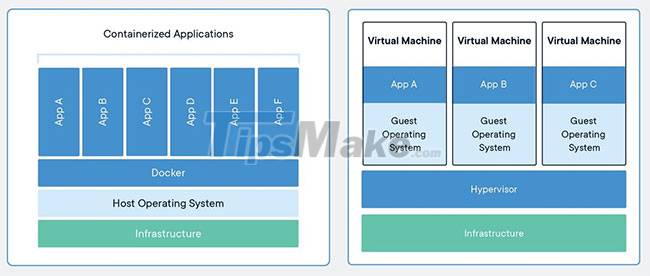6 reasons to use Docker virtualization software
Similar to virtual machines, the platform streamlines development by moving development to a test environment instead of the developer's local computer. This ensures that the entire development team is working with the same test environment and same configuration.
What is the difference between Docker and a virtual machine?
The virtual machine consists of several layers.
At the bottom you have the infrastructure (hardware). Then, the operating system (OS) of the host server, followed by a hypervisor (it creates an emulator computer), and finally the operating system containing the application. You can create multiple operating systems on a single virtual machine, which allows the development team to create different environments with different operating systems.

Docker containers, on the other hand, have a different layered structure. The main difference is that it has only one operating system. At the bottom of the Docker layer is the infrastructure, then the host operating system, followed by the container that holds the applications. This means that although all applications are independent in Docker, they share the same basic operating system services.
Since Docker does not require an operating system for each Docker container, the platform requires less memory and loads faster. The benefits of Docker have made it one of the hottest new platforms. If you haven't tried Docker yet, these 6 benefits might change your mind.
6 reasons to use Docker virtualization software
1. Easy to use
One of the best things about Docker is that it has a large community of support. The platform is open source based, which means there is a community of people invested in supporting Docker. This community support has created a great resource to help you get up and running.
2. Doesn't consume a lot of resources
By allowing containers to share basic kernel functions, much of the operating system's unnecessary stuff is eliminated. This can allow up to 4 times more server application instances than virtual machines. Docker is also faster than a virtual machine because it doesn't need to launch the operating system.
3. Better Scaling
Because Docker is so lightweight, projects take up less space on the server. More data and software can be stored in less space. You can even specify how many resources - CPU, network, memory, etc. each container can use. In addition, containers can be resized to meet the needs of the application as it grows. This allows an application to scale better than virtual machine applications, which are difficult to resize.
4. Consistent Deployment
It can be frustrating to launch a new application only to discover that it doesn't work with your user configuration. Docker solves this problem. Each container is independent and runs on the Linux kernel. As long as the end user can run the container, the container will run on their computer exactly as it does on yours.
A consistent implementation also allows developers to easily share their code. Docker container portability ensures that all developers will work on the same code in the same environment and it will run the same for everyone.
5. Provide version control
An important feature of Docker is built-in version control. Files in Docker are called images. Each image file is created from image layers. A new layer is created in an image each time the command is run. Therefore, changes to the code are automatically saved as layers in the image. The image layers basically build the change log into the image. At any time, the image can be reverted to the previous image.
The ability to quickly change between versions supports rapid testing. When testing, it is possible to make changes and quickly revert if desired using the previous image. This is a great feature for developers who use an iterative design cycle.
6. Compatible with Microservices
Microservices have become a popular alternative to monolithic systems. The purpose of Microservices is to break down large applications into smaller units that run a single feature. Services can communicate with each other and together form an application. The benefit of this approach is that each feature is isolated, which means developers can develop and maintain features independently, and allows developers to form Agile teams for each service.
Docker's container system maps well to the Microservices model. Each container is independent, like a microservice. The benefit of Microservices is that it makes maintenance and updates easier to manage. Each feature can be independently updated or debugged without the need to maintain the entire system.
The independence of services can help make the system more error-proof. If one service fails, the entire system is not down.
When should you use Docker?
Docker is a great solution for projects where:
- Version control is required.
- Multiple developers will collaborate on a project.
- Different system configurations can affect how the application runs.
- The development process will be completed in several stages.
While you can use Docker for a variety of application development projects, it offers the most benefits to distributed teams. It solves many problems that arise when working on different computers.
Docker ensures that everyone on the team will develop with the same configuration in accordance with how the application will be deployed.
Isolating Docker containers can make it easier to create several smaller development teams to work on different features.
The image file system makes it easy to track changes and revert to previous designs.
The article has covered many reasons why you should consider using Docker. Many companies have started using Docker to take advantage of its benefits.
If you're interested, there are plenty of great resources to help you get started online. Docker even offers a Lab environment on the official website, which doesn't require you to download software, so you can try Docker first.